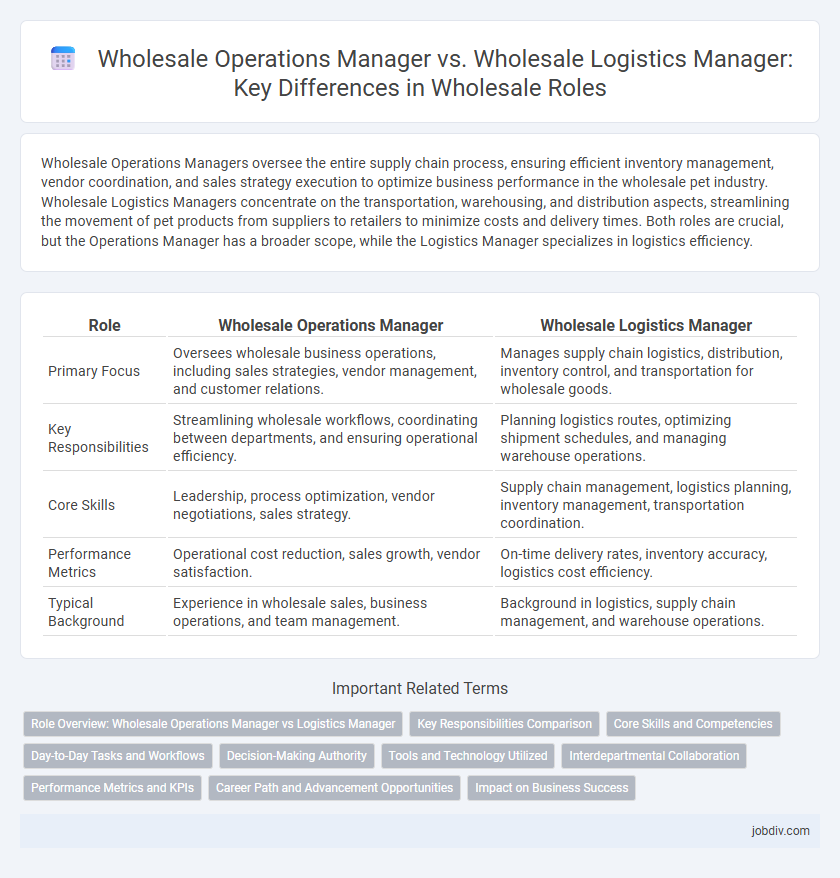Wholesale Operations Managers oversee the entire supply chain process, ensuring efficient inventory management, vendor coordination, and sales strategy execution to optimize business performance in the wholesale pet industry. Wholesale Logistics Managers concentrate on the transportation, warehousing, and distribution aspects, streamlining the movement of pet products from suppliers to retailers to minimize costs and delivery times. Both roles are crucial, but the Operations Manager has a broader scope, while the Logistics Manager specializes in logistics efficiency.
Table of Comparison
| Role | Wholesale Operations Manager | Wholesale Logistics Manager |
|---|---|---|
| Primary Focus | Oversees wholesale business operations, including sales strategies, vendor management, and customer relations. | Manages supply chain logistics, distribution, inventory control, and transportation for wholesale goods. |
| Key Responsibilities | Streamlining wholesale workflows, coordinating between departments, and ensuring operational efficiency. | Planning logistics routes, optimizing shipment schedules, and managing warehouse operations. |
| Core Skills | Leadership, process optimization, vendor negotiations, sales strategy. | Supply chain management, logistics planning, inventory management, transportation coordination. |
| Performance Metrics | Operational cost reduction, sales growth, vendor satisfaction. | On-time delivery rates, inventory accuracy, logistics cost efficiency. |
| Typical Background | Experience in wholesale sales, business operations, and team management. | Background in logistics, supply chain management, and warehouse operations. |
Role Overview: Wholesale Operations Manager vs Logistics Manager
A Wholesale Operations Manager oversees the entire supply chain process, including procurement, inventory management, and sales coordination to ensure efficient wholesale distribution. In contrast, a Wholesale Logistics Manager focuses specifically on transport, warehousing, and delivery operations to optimize the flow of goods from suppliers to customers. Both roles require strong analytical skills but the Operations Manager has a broader scope involving strategic planning, while the Logistics Manager concentrates on execution and process improvement within logistics.
Key Responsibilities Comparison
Wholesale Operations Managers oversee end-to-end supply chain processes, including procurement, inventory control, vendor management, and sales strategy execution to optimize overall operational efficiency. Wholesale Logistics Managers focus primarily on transportation, warehousing, distribution planning, and ensuring timely delivery of products to meet customer demands. Both roles require coordination across departments, but Operations Managers handle broader business functions while Logistics Managers concentrate on the physical flow of goods.
Core Skills and Competencies
Wholesale Operations Managers excel in process optimization, vendor relationship management, and inventory control, ensuring seamless order fulfillment and compliance with industry standards. Wholesale Logistics Managers specialize in supply chain coordination, transportation planning, and warehouse management, focusing on efficient product distribution and cost reduction. Both roles require strong analytical skills, leadership, and proficiency in ERP systems to drive operational efficiency and support business growth.
Day-to-Day Tasks and Workflows
Wholesale Operations Managers oversee daily processes such as inventory management, supplier coordination, and order fulfillment to ensure smooth wholesale business flow. Wholesale Logistics Managers focus on managing transportation, warehousing, and distribution channels to optimize delivery efficiency and reduce shipping costs. Both roles require collaboration but differ in scope, with operations emphasizing overall operational efficiency and logistics concentrating on supply chain execution.
Decision-Making Authority
A Wholesale Operations Manager holds broader decision-making authority, overseeing overall supply chain efficiency, inventory management, and vendor relations to drive wholesale business performance. In contrast, a Wholesale Logistics Manager focuses decision-making on the planning, coordination, and execution of transportation, warehousing, and distribution activities. The distinction in authority reflects the Operations Manager's strategic role versus the Logistics Manager's tactical responsibility within wholesale operations.
Tools and Technology Utilized
Wholesale Operations Managers primarily utilize enterprise resource planning (ERP) systems like SAP or Oracle to oversee inventory management, order processing, and supplier coordination, ensuring seamless operations. Wholesale Logistics Managers focus on transportation management systems (TMS) such as JDA or Manhattan Associates to optimize supply chain logistics, track shipments, and manage warehouse operations efficiently. Both roles rely heavily on data analytics platforms and automation tools to enhance decision-making and streamline wholesale distribution processes.
Interdepartmental Collaboration
Wholesale Operations Managers and Wholesale Logistics Managers play crucial roles in interdepartmental collaboration by ensuring seamless coordination across procurement, inventory, and sales teams. Operations Managers focus on streamlining overall processes and managing resource allocation, while Logistics Managers specialize in optimizing supply chain and distribution efficiency. Both collaborate closely to synchronize order fulfillment, reduce lead times, and maintain inventory accuracy for enhanced customer satisfaction.
Performance Metrics and KPIs
Wholesale Operations Managers focus on performance metrics such as order fulfillment accuracy, inventory turnover rate, and overall operational efficiency to ensure smooth end-to-end processes. Wholesale Logistics Managers prioritize KPIs like delivery time adherence, transportation cost per unit, and warehouse utilization rates to optimize supply chain execution. Both roles use data-driven insights but emphasize different aspects of wholesale performance to drive profitability and customer satisfaction.
Career Path and Advancement Opportunities
Wholesale Operations Managers oversee supply chain processes and coordinate vendor relations, with career advancement often leading to senior operations or general management roles. Wholesale Logistics Managers specialize in inventory control, distribution, and transportation, progressing toward director-level logistics or supply chain executive positions. Both paths offer growth prospects in large retail or manufacturing companies but differ in focus areas and industry-specific skill development.
Impact on Business Success
A Wholesale Operations Manager drives business success by optimizing overall processes, managing supplier relationships, and ensuring product availability to meet market demand effectively. In contrast, a Wholesale Logistics Manager specializes in streamlining supply chain activities, warehouse management, and distribution efficiency, directly reducing costs and delivery times. Both roles significantly impact profitability, but the Operations Manager focuses on strategic planning while the Logistics Manager emphasizes operational execution within wholesale distribution.
Wholesale Operations Manager vs Wholesale Logistics Manager Infographic

 jobdiv.com
jobdiv.com